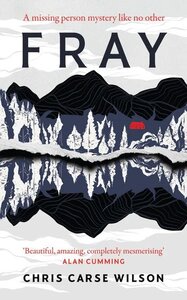Above all, the main sense I get from Chris Carse Wilson’s debut novel is that this is a book he needed to write. You can just feel the urgency of it, how much it must have meant to capture the feelings in these pages.
Fray begins with its anonymous narrator arriving at a cottage in the Scottish Highlands. The narrator’s mother died some time ago, and shortly afterwards their father disappeared, apparently unable to accept what had happened. The narrator has now traced their father to this cottage – he’s not there himself, but the place is full of papers and maps written and drawn by his hand. The novel chronicles its narrator’s attempt to piece together these texts and, hopefully, find a clue to their father’s whereabouts.
The papers are haphazard and don’t make a great deal of sense. The narrator’s father talks of searching for his wife, but also mentions the Devil. He records times and weather conditions precisely, then describes experiments whose purpose is unclear. One of his hand-drawn maps has the word ‘hotel’ marked prominently, but there doesn’t seem to be a hotel nearby. Perhaps the father has made some sort of breakthrough, but if so, its nature is inscrutable.
The narrator is driven to their wit’s end trying to puzzle all this out. Along the way, they talk about the darkness that has clouded their life at times, and the ways they’ve tried to cope. Running is one thing that helped, a way to keep moving, to hang on:
Breathing in enough to be given life, softening the pain a little, finding some colour in all the grinding grey. Remembering that something else was possible, that it could change. That was all I could hold on to, never daring to consider that it actually would change. That I would.
Fray can be seen as an active process of working through its narrator’s deep feelings – and there’s cause to wonder how much of what’s narrated is happening in the external world, and how much in the narrator’s mind. Then again, for this narrator, there may not need be much difference. Whatever your interpretation, the experience of Fray’s narrator is vivid in Carse Wilson’s telling.
Published by HarperNorth.

Recent Comments